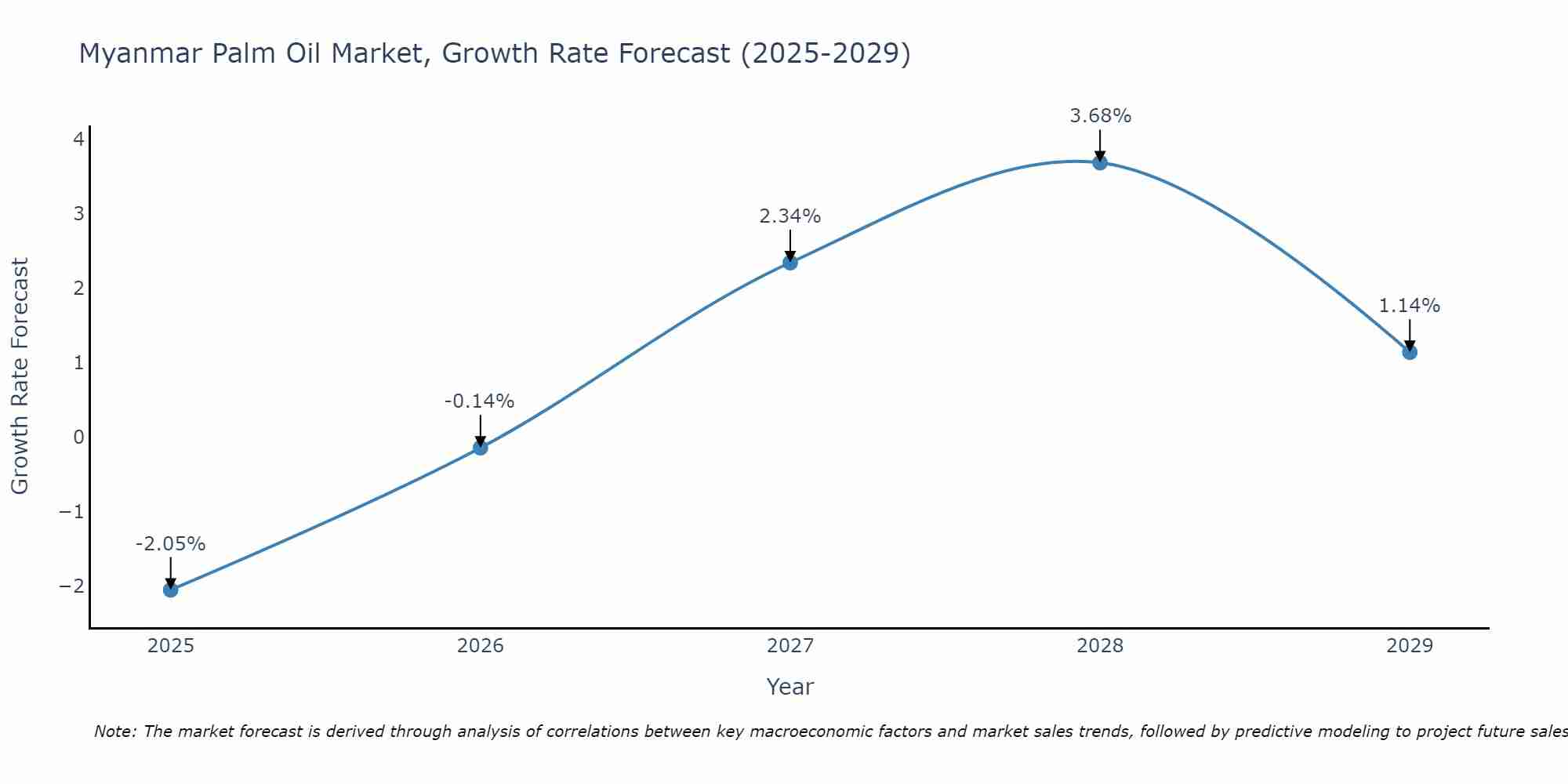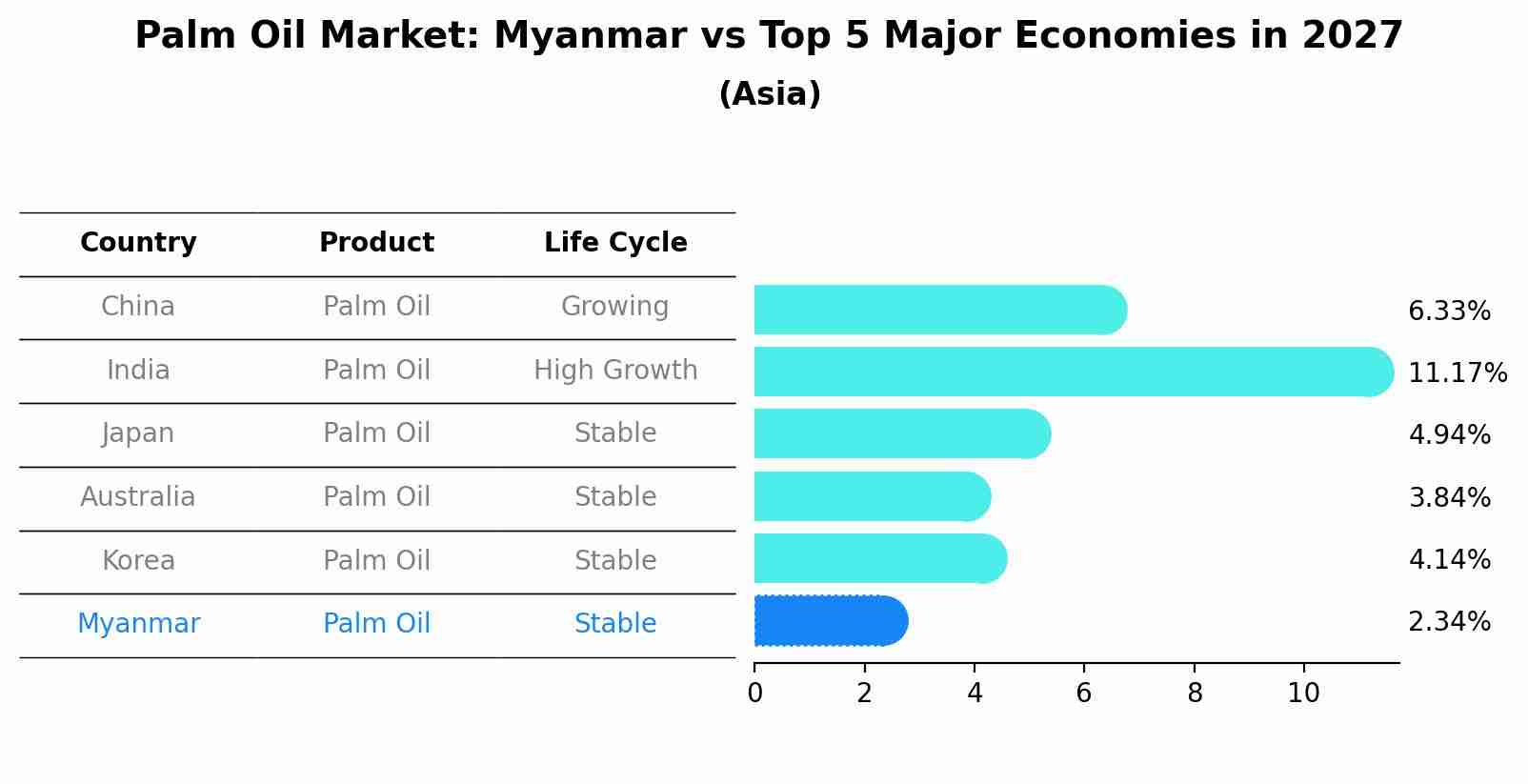Myanmar Palm Oil Market (2025-2031) Outlook | Size, Analysis, Forecast, Growth, Trends, Value, Industry, Revenue, Share & Companies
| Product Code: ETC383794 | Publication Date: Aug 2022 | Updated Date: Jul 2025 | Product Type: Market Research Report | |
| Publisher: 6Wresearch | Author: Bhawna Singh | No. of Pages: 75 | No. of Figures: 35 | No. of Tables: 20 |
Myanmar Palm Oil Market Size Growth Rate
The Myanmar Palm Oil Market is projected to witness mixed growth rate patterns during 2025 to 2029. The growth rate begins at -2.05% in 2025, climbs to a high of 3.68% in 2028, and moderates to 1.14% by 2029.

Palm Oil Market: Myanmar vs Top 5 Major Economies in 2027 (Asia)
By 2027, Myanmar's Palm Oil market is forecasted to achieve a stable growth rate of 2.34%, with China leading the Asia region, followed by India, Japan, Australia and South Korea.

Myanmar Palm Oil Market Synopsis
The Myanmar palm oil market is experiencing significant growth driven by increasing demand from various industries such as food, cosmetics, and biofuel. The country`s favorable climate for palm oil cultivation has attracted investments in plantations, leading to expansion in production levels. However, the industry faces challenges related to sustainability and environmental concerns, with issues such as deforestation and land disputes being critical areas of focus. The government has introduced regulations to address these issues and promote sustainable practices in the sector. Despite challenges, the Myanmar palm oil market presents opportunities for growth and development, with an emphasis on sustainable production practices becoming increasingly important for both domestic consumption and international exports.
Myanmar Palm Oil Market Trends
The Myanmar Palm Oil Market is experiencing growth driven by increasing demand from various industries such as food processing, cosmetics, and biofuels. The country`s favorable climate for palm oil cultivation has attracted investment in plantations and processing facilities, leading to higher production levels. However, sustainability concerns have also risen, prompting companies to adopt more environmentally friendly practices and seek certification. The government`s focus on promoting sustainable agriculture practices and increasing domestic production to reduce reliance on imports is expected to shape the market`s future trajectory. Additionally, rising consumer awareness about the environmental and social impact of palm oil production is driving demand for certified sustainable products in the market.
Myanmar Palm Oil Market Challenges
In the Myanmar Palm Oil Market, challenges primarily stem from environmental concerns and sustainability issues. Deforestation, land grabbing, and destruction of biodiversity are major challenges faced by the industry, leading to negative impacts on local communities and the environment. Additionally, lack of proper regulations and enforcement mechanisms further exacerbate these issues, making it difficult to ensure responsible and sustainable palm oil production practices. Market volatility, fluctuating prices, and competition from other vegetable oils also present challenges for palm oil producers in Myanmar. Addressing these challenges requires concerted efforts from all stakeholders, including government bodies, industry players, and consumers, to promote sustainable practices and ensure the long-term viability of the palm oil market in Myanmar.
Myanmar Palm Oil Market Investment Opportunities
Investment opportunities in the Myanmar Palm Oil Market include investing in palm oil plantations, processing facilities, and the distribution of palm oil products. Myanmar has favorable agro-climatic conditions for palm oil cultivation, with vast available land suitable for planting. The increasing global demand for palm oil presents a growth opportunity for investors in Myanmar. Additionally, the government has been implementing policies to promote the palm oil industry, such as offering tax incentives and providing support for infrastructure development. Investing in sustainable palm oil production practices can also appeal to socially responsible investors. However, potential investors should be mindful of environmental and social concerns associated with palm oil production and ensure compliance with sustainability standards to mitigate risks and enhance long-term profitability.
Jordan Agar Market Government Policies
The Myanmar government has implemented various policies related to the palm oil market, aiming to regulate and promote sustainable practices in the industry. In 2016, the government introduced the National Land Use Policy to address land tenure issues, including the allocation of land for palm oil cultivation. Additionally, the Myanmar Investment Commission (MIC) has set guidelines for foreign investment in the palm oil sector to ensure environmental protection and local community engagement. The government also established the Myanmar Sustainable Palm Oil (MSPO) standard to encourage sustainable production practices among palm oil growers. Despite these efforts, challenges such as deforestation, land grabbing, and labor rights violations persist in the Myanmar palm oil market, highlighting the need for continued policy development and enforcement to achieve a more sustainable and ethical industry.
Myanmar Palm Oil Market Future Outlook
The future outlook for the Myanmar Palm Oil Market appears promising, driven by increasing demand for edible oils, growth in the food processing industry, and rising awareness of the health benefits of palm oil. The country`s favorable climate for palm oil cultivation and government support for the agriculture sector are expected to further boost production. However, challenges such as land rights issues, environmental concerns, and competition from other vegetable oils could impact the market`s growth trajectory. Sustainable practices and certifications are likely to become more important for market players to meet consumer demands and regulatory requirements. Overall, with proper management and strategic investments, the Myanmar Palm Oil Market is poised for steady growth in the coming years.
Key Highlights of the Report:
- Myanmar Palm Oil Market Outlook
- Market Size of Myanmar Palm Oil Market, 2024
- Forecast of Myanmar Palm Oil Market, 2031
- Historical Data and Forecast of Myanmar Palm Oil Revenues & Volume for the Period 2021 - 2031
- Myanmar Palm Oil Market Trend Evolution
- Myanmar Palm Oil Market Drivers and Challenges
- Myanmar Palm Oil Price Trends
- Myanmar Palm Oil Porter's Five Forces
- Myanmar Palm Oil Industry Life Cycle
- Historical Data and Forecast of Myanmar Palm Oil Market Revenues & Volume By Nature for the Period 2021 - 2031
- Historical Data and Forecast of Myanmar Palm Oil Market Revenues & Volume By Organic for the Period 2021 - 2031
- Historical Data and Forecast of Myanmar Palm Oil Market Revenues & Volume By Conventional for the Period 2021 - 2031
- Historical Data and Forecast of Myanmar Palm Oil Market Revenues & Volume By Product for the Period 2021 - 2031
- Historical Data and Forecast of Myanmar Palm Oil Market Revenues & Volume By CPO for the Period 2021 - 2031
- Historical Data and Forecast of Myanmar Palm Oil Market Revenues & Volume By RBD Palm Oil for the Period 2021 - 2031
- Historical Data and Forecast of Myanmar Palm Oil Market Revenues & Volume By Palm Kernel Oil for the Period 2021 - 2031
- Historical Data and Forecast of Myanmar Palm Oil Market Revenues & Volume By Fractionated Palm Oil for the Period 2021 - 2031
- Historical Data and Forecast of Myanmar Palm Oil Market Revenues & Volume By End-use for the Period 2021 - 2031
- Historical Data and Forecast of Myanmar Palm Oil Market Revenues & Volume By Food & Beverage for the Period 2021 - 2031
- Historical Data and Forecast of Myanmar Palm Oil Market Revenues & Volume By Personal Care & Cosmetics for the Period 2021 - 2031
- Historical Data and Forecast of Myanmar Palm Oil Market Revenues & Volume By Biofuel & Energy for the Period 2021 - 2031
- Historical Data and Forecast of Myanmar Palm Oil Market Revenues & Volume By Pharmaceuticals for the Period 2021 - 2031
- Historical Data and Forecast of Myanmar Palm Oil Market Revenues & Volume By Others for the Period 2021 - 2031
- Myanmar Palm Oil Import Export Trade Statistics
- Market Opportunity Assessment By Nature
- Market Opportunity Assessment By Product
- Market Opportunity Assessment By End-use
- Myanmar Palm Oil Top Companies Market Share
- Myanmar Palm Oil Competitive Benchmarking By Technical and Operational Parameters
- Myanmar Palm Oil Company Profiles
- Myanmar Palm Oil Key Strategic Recommendations
Frequently Asked Questions About the Market Study (FAQs):
- Single User License$ 1,995
- Department License$ 2,400
- Site License$ 3,120
- Global License$ 3,795
Search
Thought Leadership and Analyst Meet
Our Clients
Related Reports
- Afghanistan Rocking Chairs And Adirondack Chairs Market (2026-2032) | Size & Revenue, Competitive Landscape, Share, Segmentation, Industry, Value, Outlook, Analysis, Trends, Growth, Forecast, Companies
- Afghanistan Apparel Market (2026-2032) | Growth, Outlook, Industry, Segmentation, Forecast, Size, Companies, Trends, Value, Share, Analysis & Revenue
- Canada Oil and Gas Market (2026-2032) | Share, Segmentation, Value, Industry, Trends, Forecast, Analysis, Size & Revenue, Growth, Competitive Landscape, Outlook, Companies
- Germany Breakfast Food Market (2026-2032) | Industry, Share, Growth, Size, Companies, Value, Analysis, Revenue, Trends, Forecast & Outlook
- Australia Briquette Market (2025-2031) | Growth, Size, Revenue, Forecast, Analysis, Trends, Value, Share, Industry & Companies
- Vietnam System Integrator Market (2025-2031) | Size, Companies, Analysis, Industry, Value, Forecast, Growth, Trends, Revenue & Share
- ASEAN and Thailand Brain Health Supplements Market (2025-2031) | Strategy, Consumer Insights, Analysis, Investment Trends, Opportunities, Growth, Size, Share, Industry, Revenue, Segments, Value, Segmentation, Supply, Forecast, Restraints, Outlook, Competition, Drivers, Trends, Demand, Pricing Analysis, Competitive, Strategic Insights, Companies, Challenges
- ASEAN Bearings Market (2025-2031) | Strategy, Consumer Insights, Analysis, Investment Trends, Opportunities, Growth, Size, Share, Industry, Revenue, Segments, Value, Segmentation, Supply, Forecast, Restraints, Outlook, Competition, Drivers, Trends, Demand, Pricing Analysis, Competitive, Strategic Insights, Companies, Challenges
- Europe Flooring Market (2025-2031) | Outlook, Share, Industry, Trends, Forecast, Companies, Revenue, Size, Analysis, Growth & Value
- Saudi Arabia Manlift Market (2025-2031) | Outlook, Size, Growth, Trends, Companies, Industry, Revenue, Value, Share, Forecast & Analysis
Industry Events and Analyst Meet
Whitepaper
- Middle East & Africa Commercial Security Market Click here to view more.
- Middle East & Africa Fire Safety Systems & Equipment Market Click here to view more.
- GCC Drone Market Click here to view more.
- Middle East Lighting Fixture Market Click here to view more.
- GCC Physical & Perimeter Security Market Click here to view more.
6WResearch In News
- Doha a strategic location for EV manufacturing hub: IPA Qatar
- Demand for luxury TVs surging in the GCC, says Samsung
- Empowering Growth: The Thriving Journey of Bangladesh’s Cable Industry
- Demand for luxury TVs surging in the GCC, says Samsung
- Video call with a traditional healer? Once unthinkable, it’s now common in South Africa
- Intelligent Buildings To Smooth GCC’s Path To Net Zero


















